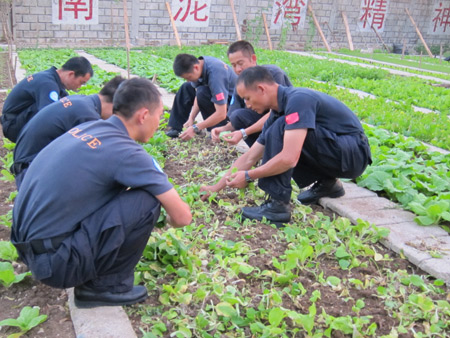Global General
Peacekeepers with Chinese characteristics
By Chen Weihua and Huo Yongzhe (chinadaily.com.cn)
Updated: 2010-01-24 10:42
 |
Large Medium Small |
PORT-AU-PRINCE: The Chinese peacekeepers in Haiti do everything as forces from other nations - patrolling the streets, guarding key spots and checking vehicles. But there is one thing that seems to be uniquely Chinese.
|
 Chinese peacekeepers examine vegetables they grow inside their compound in the Sonapi industrial zone near the airport in Port-au-Prince of Haiti. [chinadaily.com.cn] |
They grow a dozen kinds of vegetables inside their compound in the Sonapi industrial zone near the airport in Port-au-Prince, ranging from Chinese cabbage, spinach and sponge gourd to garlic and radish.
In fact, the nine battalion teams, each with 10 police officers, all have their small plot of farmland. And there is a monthly competition to assess who produce the most veggies, according to Hou Huiqian director of the office for the command center of the 120-man Chinese UN peacekeeping police in Haiti.
Around 5pm each afternoon, Hou would take a walk to the three different veggie plots inside the compound.
"It provides a good supply of fresh veggies and vitamin to our peacekeepers," Hou said.
He said that UN peacekeepers from other nations and visiting official from China are both amazed by the scene. Besides China, Sri Lankan peacekeepers are probably the only other forces which grow only one kind of vegetable in their base.
On the inside wall surrounding the peacekeeping compound, huge Chinese characters meaning "Keep the Spirit of Nanniwan" were written. Nanniwan was a site of a famous farming movement launched by the Chinese communist army in the 1930s in a bid to survive the aggressive encroachment of the mighty KMT army.
On a late afternoon this past weekend, peacekeepers were seen watering vegetables, spraying organic fertilizer, getting rid of the weeds and harvesting ready ones. Some of the veggies might end in the dinner table an hour later or the next day.
Every team has a few from the countryside and they are the ones doing the key work such as watering. For people who never did farm work, he starts by picking up weeds, said a soldier ploughing the land.
"This is a lot of fun after standing on guard and patrolling in the day," said Chen Yongjun, a senior officer of the Chinese peacekeepers, also known as Formed Police Unit in the United Nations term.
The home-grown veggies now accommodate for some 60 per cent of the vegetable supply in the Chinese compound, he said.
Chen Yongjun, from Yunnan province, said he did not learn how to grow vegetable until he joined the army. "I have been in service for 15 years and I know a lot about the growing veggies now," said Chen, who served in China's Southwest Yunnnan border frontier before coming to Haiti.
Another peacekeeping police officer talked about how green the vegetables are since no chemical fertilizer is used.











